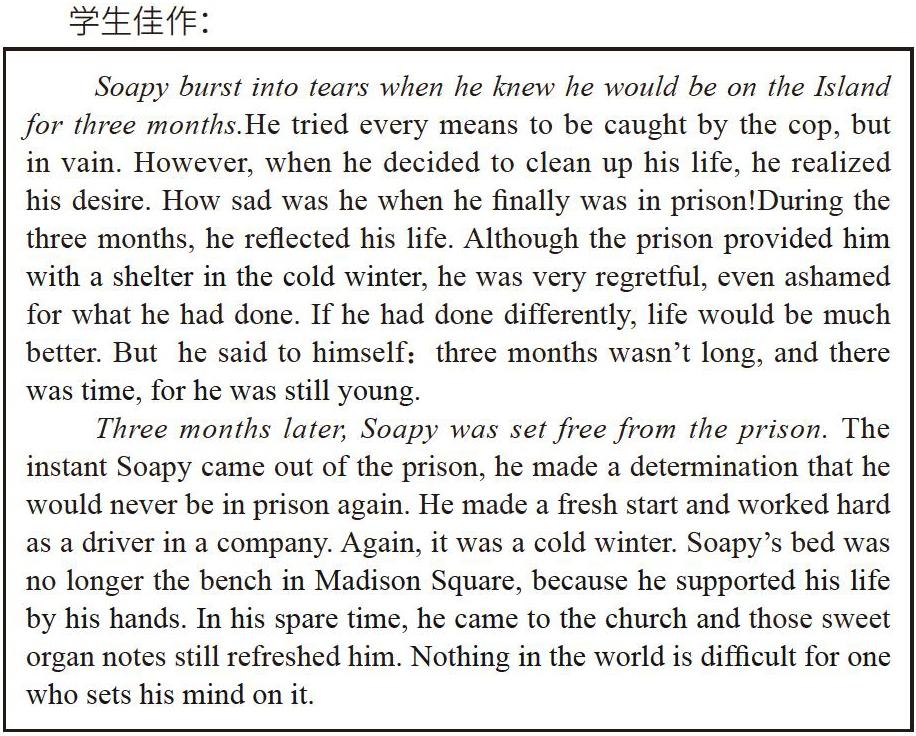读后续写题型Making Inferences 策略使用初探
2021-04-12汤红艳


【摘要】作为新高考题型改革的产物,读后续写为高中英语“读”与“写”的教学提供了方向指引,通过创新读后续写教学,进而有效提升学生应对新题型的备考能力,切实把学科核心素养培养落到实处。本文首先分析了Making Inferences这一解答读后续写题型策略,进一步通过实例探究Making Inferences的有效教学策略,旨在切实提升学生读后续写题型解答能力,有效提升学生的英语核心素养。
【关键词】读后续写题型;推断;思维品质;阅读;信息差
【作者简介】汤红艳,福建省晋江市毓英中学。
【基金项目】本文系教育部福建师范大学基础教育课程研究中心2020年开放课题“新高考读后续写题型‘读思达教学研究”(编号:KCZ2020060)的研究成果。
一、问题提出的背景
读后续写是近几年高考英语试卷中出现的新题型,这一题型有以下特点:题目给出350词左右的文本(一般为记叙文),还给出首句未完成的两个段落。题目要求考生先阅读文本,根据文章内容及所给段落开头语的线索和逻辑,合理展开想象,然后完成150词左右的写作,写作内容应与阅读文本在情节、人物角色性格、文本结构等方面衔接自然,逻辑合理。通过对这一题型的探究我们可以发现,学生在解答这个题型的过程是读—思—达的过程,即在阅读时提取要点,进行思维的延续,最后在这两者的基础上完成写作(表达)。在教学中我们发现,有一部分教师对这个题型的教学与备考聚焦在文本的阅读和写作上,没有在思上下功夫,忽略了读写的中间连接环节——思考。从教学效果看,这样的教学导致的结果就是读与写分离。读与写一旦脱离,就容易出现以下问题:学生写作无话可说,内容脱离文本本意,写作逻辑混乱,续写段落与前面的文本衔接不合理,甚至堆砌词汇、离题等。因此,在读后续写中重视“思”的环节,构建读与写的桥梁是精准定位题型特点、对题型进行精准化教学与提升学生备考能力的关键,同时也是提升学生思维品质,落实核心素养的要求。
二、使用Making Inferences策略的意义
学生在阅读文本后,对获取的信息进行处理,思考写作内容,补充读与写的信息差的方法很多,其中Making Inferences是读后续写过程中能够清楚梳理阅读文本故事的线索,合理铺垫情节,提高写作逻辑准确度的策略。
什么是Making Inferences?从inference的词义看:Inference is drawing conclusions based on information that has been implied rather than directly stated and is an essential skill in reading comprehension. Marzano在On Excellence in Teaching(Marzano, R. J. 2010.)中认为:Inference is a “foundational skill” —— a prerequisite for higher-order thinking and 21st century skills.
由以上内容我们可以看出,教会学生进行推断是提升他们思考能力的重要技能。此外,高层次的思维能力称为高阶思维,预测、分析、概括、推断、评判、质疑等都是培养高阶思维的方法。由此可见,教会学生Making Inferences策略在理论上和实践上都具实际的意义。
三、读后续写课堂使用Making Inferences策略的具体做法
本文以“美国短篇小说之父”欧·亨利(O·Henry)著名的短篇小说《警察与赞美诗》(The Cop and the Anthem)为例,具体阐述如何在读后续写教学中使用Making Inferences策略。本文用作例子来阐述的这篇小说是原著改編版的英文小说,原文出自网站轩宇阅读网,网址为https://www.xyyuedu.com/wgmz/ouhengliduanpianxiaoshuoji/300164.html。《警察与赞美诗》集中体现了欧·亨利作品的风格,人物角色性格分明,故事线索清楚,情节逻辑明晰。此外,小说情节一波三折,发展到高潮阶段时立即停止,留下悬念,出乎意料却合情合理,令读者回味无穷。因此,这一文本可以作为良好的训练读后续写的材料,具体的教学过程如下:
学生首先自主阅读故事。完成文本阅读并整体感知故事后,教师进行一个“Free talk:What do you know about the author, great novelist O·Henry?”。学生自由发言,说说他们自己对于欧·亨利小说特点的理解和了解。一般而言,学生或多或少都读过欧·亨利的小说,因此他们基本上都能说出一些欧·亨利小说的特点。当然,如果学生对这方面的知识了解不多,教师也应当适当补充相关的知识。一定背景知识的介绍有助于学生对结尾情节进行合理推断,同时也拓展学生的知识面提升学生的思维品质与文化意识。
接着,教师使用Making Inferences策略引导学生从文本中找出线索,根据人物的性格特点和所阅读文本中的情节对后文发生的情节进行合理推断和预测。
T guides the Ss to analyze the information from the text and answer this question:
Inference 1: What might Soapy feel when he knew he would be on the Island for three months ?
Clue 1:Three months on the Island was what his soul desired. Three months of assured board and bed and good company, safe from north winds and policemen, seemed to Soapy the most desirable thing.(para 4)
Clue 2: He went towards Madison Square, for the home instinct remains even when the home is a park bench.(para 32)
Clue 3: And the anthem that the organist played cemented Soapy to the iron fence, for he had known it well in the days when his life contained such things as mothers and roses and ambitions and friends.(para 34)
Clue 4:The influence of the music and the old church produced a sudden and wonderful change in Soapy's soul. He saw with horror the pit into which he had fallen. He thought of his degraded days, dead hopes and wrecked faculties.(para 35)
Clue 5: And also in a moment a strong impulse moved him to battle with his desperate fate. He would pull himself out of this pit; he would make a man of himself again. There was time; he was young yet. Those sweet organ notes had set up a revolution in him. Tomorrow he would be somebody in the world. He would -(para 36)
在這一步骤中,教师引导学生根据小说的背景知识和文中的线索进行深度思考,作出推论,推断Soapy 在听到宣判入狱三个月时的感受。在引导学生进行推论的时候,教师还要注意以不断追问来进行质疑,例如:Do you need to change your thinking? 这样学生在分析线索,不断进行推理思考中,逐渐明晰情节的发展与文章的主要线索逻辑,对所需要的问题进行推断。学生在Making inferences活动的引领下,就能顺畅说出sad、regretful、ashamed等词汇,为后面的写作做了很好的铺垫。
教师在帮助学生了解实施Making inferences策略的基本步骤之后,将Making inferences 策略交给学生去实践和使用,教师提供worksheet(见表1),学生分组阅读与同伴分享自主进行making inferences。
Inference 2: What might Soapy think when he was in prison?
Inference 3: What might Soapy do in the three months during which he was in prison?
Inference 4: What might Soapy do after three months when he was free from prison?
Inference 5: What does the writer want to reveal through the novel?
最后,教师让学生基于自己的思考和作出的推论进行后面步骤的续写。为避免因学生个体差异而造成的信息差,教师按照目前读后续写的考试模式,给续写的两个段落提供首句。段1:Soapy burst into tears when he knew he would be on the Island for three months. 段2:Three months later, Soapy was set free from the prison. 在前面阶段文本中所获得的信息、Making inferences阶段所做的推论及两个段落的首句的铺垫下,学生完成文本续写任务可以说是水到渠成。
学生佳作:
Soapy burst into tears when he knew he would be on the Island for three months.He tried every means to be caught by the cop, but in vain. However, when he decided to clean up his life, he realized his desire. How sad was he when he finally was in prison!During the three months, he reflected his life. Although the prison provided him with a shelter in the cold winter, he was very regretful, even ashamed for what he had done. If he had done differently, life would be much better. But he said to himself:three months wasnt long, and there was time, for he was still young.
Three months later, Soapy was set free from the prison. The instant Soapy came out of the prison, he made a determination that he would never be in prison again. He made a fresh start and worked hard as a driver in a company. Again, it was a cold winter. Soapys bed was no longer the bench in Madison Square, because he supported his life by his hands. In his spare time, he came to the church and those sweet organ notes still refreshed him. Nothing in the world is difficult for one who sets his mind on it.
由學生的习作可以看出,推断建立在对文本深层次的理解上,学生通过策略的使用对文本的主题、线索、逻辑、情节的发展进行了深入思考。因此,在续写时,他们紧扣Making inferences的五个问题,把握文章主要线索,对主人公所想、所做、所为进行发散思维。由写作成果可以看出,他们摆脱了写作内容上无话可说的困境,所写的内容无论在逻辑上还是在情节上与原文本衔接都比较自然。
在读后续写题型教学实践中,组织学生进行一段时间的Making inferences策略的训练后,学生逐步掌握了写作前的思考流程,每次考试他们能够在文章线索下面画线,然后用Making inferences进行思考。久而久之,他们的总结与推论能力得到了提高,写作水平也得到了提高。因此,教师在应对高考新题型的过程中,积极探索读后续写题型的有效教学方法,重视读写的中间思考环节,把深入思考的重要策略交给学生去实践,在提升学生应对新题型的备考能力的同时,真正把核心素养落到实处。
参考文献:
[1]Marzano R J. Developing Expert Teachers. In R. J. Marzano (Ed.), On Excellence in Teaching[M]. (10th ed.). Bloomington, IN: Solution Tree Press, 2010.
[2]Making Inferences and Drawing Conclusions. 6 Nov. 2003. Cuesta College[OL]. https://www.thoughtco.com/making-inferences- 3111201.
